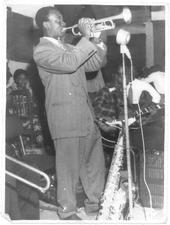T he undisputed King of Highlife music, E.T. Mensah was one the founding fathers of African popular music. His career stretched from the early 1930s to the late 1980s, and his music reached beyond Ghana to all corners of Africa and Europe.
Emmanuel Tettey Mensah was a natural musician, whose talent was spotted at school by "Teacher" Joe Lamptey. When Lamptey formed the Accra Orchestra in the early 1930s E.T. joined as a piccolo player. He soon progressed to saxophone and also learned to play organ and trumpet.
J.A. Mallet and E.T. (right) in 1937
After leaving school he teamed up with his brother Yebuah and the influential jazz drummer Guy Warren [Kofi Ghanaba] in the Accra Rhythmic Orchestra.
E.T. was also studying pharmacy. In 1943 he qualified and was stationed in the Ashanti region. When he returned to Accra in 1947 he joined the original Tempos band with Joe Kelly and Guy Warren.
"We urgently wanted an indigenous rhythm to replace the fading foreign music of waltz, rumba, etc," Mensah told the writer and highlife archivist, John Collins. "We evolved a music relying on basic African rhythms. A criss-cross African cultural sound, so to speak. No one can really lay claim to its creation. It had always been there, entrenched in West African culture. What I did was give highlife world acceptance."
In 1948 Mensah broke away to re-from the Tempos under his own leadership, offering a revitalised version of highlife, with more modern instrumentation and a wide variety of local rhythms.
The Tempos' relaxed style was immediately popular. In 1953 Mensah made his first solo trip to London where he performed with jazz regulars in the African clubs of Soho and recorded some 78rpms for HMV's GV series..
In 1956, E.T. welcomed Louis Armstrong on his tour of Africa and they jammed together in front of enormous crowds. By now E.T. had his own club, the Paramount, where Armstrong played. Officially acknowledged by the Nkrumah government, E.T. and the band set out in 1958 on a tour of Cote d'Ivoire, Liberia, Guinea and Sierra Leone, which included playing for several heads of state.
His records were well known, with songs such as "Nkebo Baaya" reaching as far as Congo. Even so, by the 1960s, E.T. was playing part-time, saying that he had never expected to earn a living from music. In 1969 he took a new Tempos line-up to England for a three month tour, culminating in a dance at the London Hilton Hotel. The repertoire now included elements of Congo rumba, soul and pop as well as calypso and the new reggae beat which was dominating London.
E.T.'s contribution to Ghanaian and African heritage was never forgotten. In 1989 he was formally honoured with the title Okunini (Very famous man) for his contribution to the country's culture. He was also awarded an honorary doctorate. More recently his music has been revived in cinema and television advertising, historical documentaries including the epic People's Century series, and CD-Rom encyclopedias.
E.T. Mensah's highlife was the sound of African independence days. He will always have a place in the hearts of West Africans.
